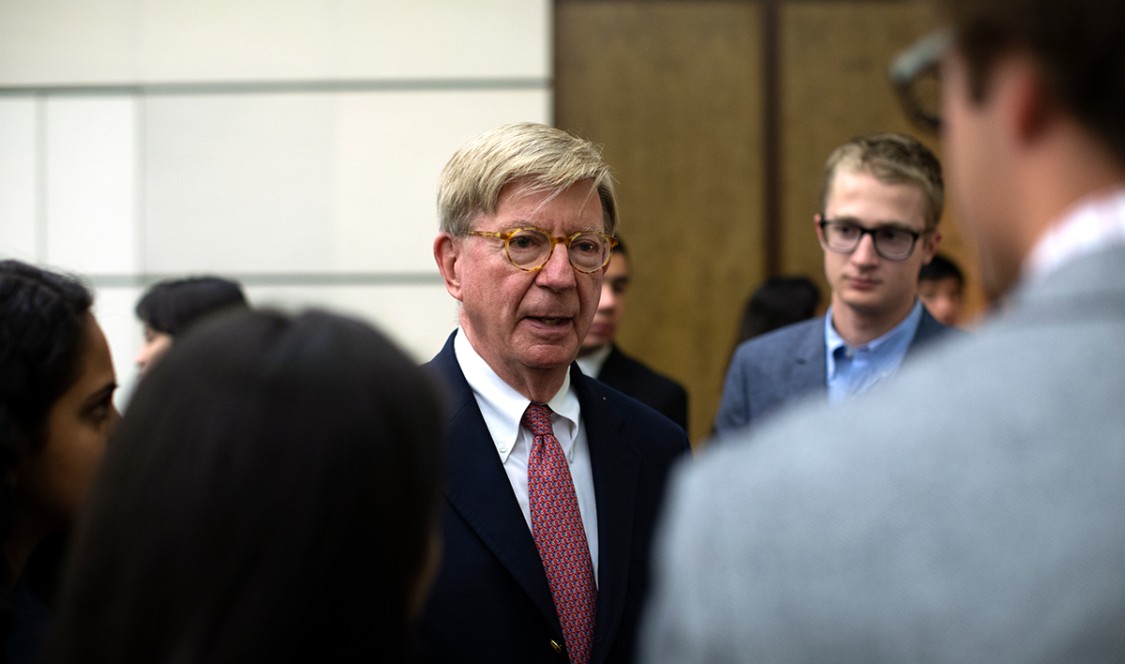Two days after the elections, George Will could have spent an hour talking about the midterms and President Donald Trump.
Instead, the Pulitzer Prize-winning Washington Post columnist explained that everything you need to know about American political philosophy is an argument between two former Presidents and Princeton alumni (also Will’s alma mater), James Madison and Woodrow Wilson.
Will called Madison’s belief in the doctrine of natural rights the basis of our Constitution. Human nature is fixed, so government should inherently be limited, he said.
Wilson’s progressivism, on the other hand, emphasized that there is no constant in the human condition—so there can be no constant in government. Life is what people make of it, and the government should broaden its scope and help with that evolution.
“Some believe that change means improvement. It is a synonym for improvement,” Will said. “But some look at world history and say, actually not. A great deal of change is retrograde—awful and dangerous.
“This is the drama in our argument. And it goes all the way back to Madison and Wilson.”
It is also an argument “about American politics worth having, and an argument worth studying at Claremont McKenna,” Will said. However, he lamented that his framework is not the one that guides debate in public life—a forum he has participated in and influenced for the past 50 years.
“If we could just get into this argument. … instead of worrying about caravans and all this other rubbish, this would be a tremendously good time to be engaged,” Will said.
Will’s authority as a dean of conservative thought and longtime political commentator (he still makes regular appearances on MSNBC and NBC) meant that he would inevitably be asked about current events.
He was especially pleased to speak at the Marian Miner Cook Athenaeum because CMC represents the “gold standard” among colleges “for taking seriously the American founding and its continued relevance.” Though he avoided “delving into the shallows of electoral politics” during his 40-minute address, he took contemporary topics head-on during the question period that followed:
-
On President Trump:
“We have a President who thinks (Supreme Court) justices sign bills, which means we have a President who would flunk a sixth-grade civics exam.” -
On Democrats being an antidote to Trump:
“It’s up to Democrats to do something sensible, and I suppose with the law of averages, they might do that someday.” -
On political anger:
“The word addiction fits here. People are addicted to anger now. … I think if you mapped their brains, the way you do with a cocaine addict, you’d see pleasure synapses light up when they’re furious.” -
On media and cable news:
“If people want to watch Fox or watch NBC, that’s fine. But they both have the same business model. It’s not grow your audience, it’s feed your audience. Keep people enflamed.” -
On no longer registering to vote as a Republican:
“It doesn’t take courage to leave a political party. It’s like changing your socks.” - On the future of the Republican party:
“Nothing lasts. The continents are drifting still, for Pete’s sake. Why should the Republican party endure forever?”
For the final point, Will offered a potential solution. He cheekily plugged his new book—The Conservative Sensibility, out next summer—as a last life preserver for the GOP he once knew.
“It explains what conservatism is. I think when it sweeps the country, causing the logistical capacity of Amazon to buckle under the weight of public demand for my book, people will say, ‘Ah, I see!’ And conservatism will be reborn,” Will said, pausing.
“Or not. We’ll see.”
—Thomas Rozwadowski

